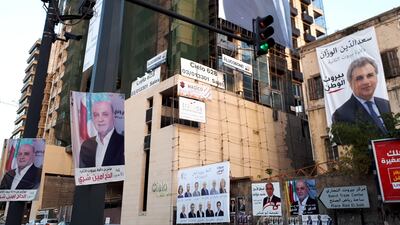Lebanon’s parliament on Tuesday confirmed elections would be held on March 27, in its first meeting since Prime Minister Najib Mikati was confirmed in September.
The session at Beirut's Unesco palace also saw parliament vote in favour of allowing Lebanese expatriates' participation in the early elections. It was also expected to see parliament elect new heads of committees, as well as debate the introduction of quotas for women in the legislature.
Early elections were just one of several demands of the many opposition groups, born out of the October 2019 uprisings. Since the Beirut port blast last August, many of the established political parties have also pushed for the vote to be bought forward, citing it out as the only way out of the political morass currently miring Lebanon.
The main objection came from Gebran Bassil, head of the Free Patriotic Movement, who claimed that the country’s meteorological authority had warned of likely storms on election day, which would inhibit voting. He vowed to challenge the decision to change the election date.
The vote had been scheduled to take place in May.
Allowing the Lebanese diaspora to vote in elections is controversial, as it could tip the balance in a delicate political system arranged by sect. Earlier this month, analysts told The National the Lebanese diaspora would probably reject the country's traditional political parties. The topic had taken on a new urgency before next year's elections, given the number of Lebanese who have emigrated amid the political and economic crises of the last two years.
The first session also triggers parliamentary immunity for all MPs, some of whom are under investigation for the roles they played in the Beirut blast in August 2020 – notably Ali Hassan Khalil, the former finance minister who had an arrest warrant issued in his name last week, prompting protests by Hezbollah and Amal.
The last time parliament met, in September, it was to give a vote of confidence to the new government of Najib Mikati. Mr Mikati was asked to keep his remarks short because of power cuts caused by a national fuel crisis.
Mr Mikati’s confirmation ended 13 months of caretaker governance after the administration of Hassan Diab resigned after the Beirut port explosion in August 2020. Yet the country has appeared, in the past week, to have already lurched closer to another political crisis.
Street clashes left seven people dead on Thursday after Hezbollah and Amal called a protest against Tarek Bitar, the judge leading the investigation into the port explosion, whom they accuse of politicising the probe.
On Monday night, Nasrallah accused his Christian rival, the Lebanese Forces, of attempting to stoke a new civil war and said he held the group, led by Samir Geagea, responsible for the street violence.
Hezbollah and Amal, the country’s two most powerful Shia parties, announced they would not attend cabinet until Mr Bitar is removed from the investigation, a cabinet meeting last Wednesday was cancelled as a result of the threats.
The warning led Mr Mikati to announce he wouldn’t call cabinet to meet until the standoff over the port blast investigation had been resolved.












